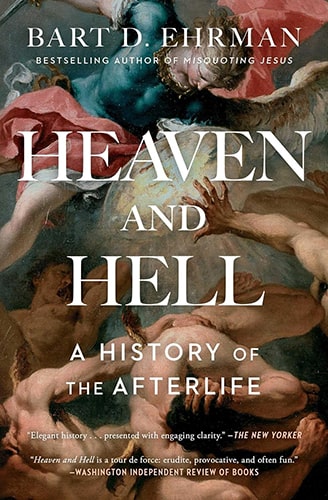|
In early Christianity, the descriptions of hell were intended to scare the hell out of you, or as Bart Ehrman writes, “to scare you out of hell.”
Finding this book was just another case of wandering the aisles of a bookstore. But unlike Read This for Inspiration, this book cover caught my eye because it was not plain and simple.
The author was raised in the Episcopal church and became a born-again evangelical as a teenager. He then studied ancient languages to understand the original words of the Bible. While pursuing a degree at Princeton Theological Seminary, Ehrman found contradictions and discrepancies in the biblical manuscripts that could not be reconciled with his faith. In his latest book, Ehrman examines the history of the afterlife throughout Greek, Jewish, and early Christian cultures. “...a glorious hereafter for some souls and torment for others…cannot be found either in the Old Testament or in the teachings of the historical Jesus. To put it succinctly: the founder of Christianity did not believe that the soul of a person who died would go to heaven or hell.” The concepts of heaven and hell – that would be recognized by Christians today – have evolved since ancient times. What began as a Day of Judgment for all in the time of Jesus became a judgment for each individual at the time of death. Ehrman says these ideas of the afterlife emerged over a long period of time to explain the injustice of this world and the ultimate triumph of good over evil. “Thinkers came to believe that no one can live a life of sin, hurting others…and then die and get away with it.” By presenting biblical, philosophical, and literary texts in chronological order, Ehrman’s book lets the prophets, philosophers, and poets speculate on where we go from here. Do we fear death or do we fear life is over? The Greek philosopher Epicurus (341 - 270 BCE) is pithy in response: “So death, the most frightening of bad things, is nothing to us; since when we exist, death is not present, and when death is present, then we do not exist.” The Roman poet and philosopher Lucretius (99 - 55 BCE) is more direct in his assessment of life after death, saying that a person who no longer exists cannot suffer – any more than they suffered before they came into existence. “Look back at the eternity that passed before we were born, and mark how utterly it counts to us as nothing. This is a mirror that nature holds up to us, in which we may see the time that shall be after we are dead.” When life ends, what follows according to Christian belief – annihilation, immortality, or resurrection? Any certainty about life beyond the grave remains in the realm of faith. But before we leave this world, there is no doubt that Ehrman’s book gives us much to consider. Comments are closed.
|
Fold Gently
Books overlooked. Bakes for home bakers. Places unexpected. Find your new favorite thing. |


